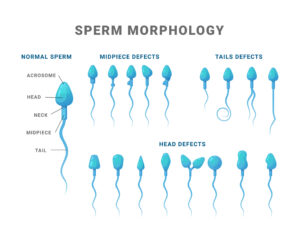Achieving fatherhood with male infertility
Most men assume that when it’s time to become a father, getting there will be easy – and even fun. However, many men are surprised to find that infertility is not just a “female problem.” In fact, male infertility affects many couples on their journey to parenthood with male factor being a significant contributor in roughly half of infertility cases.
Our fertility specialist offers quick diagnosis and effective solutions to overcome male infertility, putting men on the path to fatherhood. Dr. Glatstein, our New Jersey male infertility specialist, has undergone special advanced training in Andrology at one of the top male infertility centers in the country at the Cleveland Clinic. In addition, he has also been a Lecturer in Assisted Reproduction at the Cleveland Clinic.
Causes of male infertility
To fertilize an egg, sperm must be able to swim normally. Issues with sperm number, movement or sperm shapes can interfere with natural conception. Genetic issues with either the sperm or the egg can also cause an embryo to fail to develop normally.
Factors such as hormonal imbalances, genetic conditions, testicular injury, vascular problems, medications or lifestyle choices can contribute to male infertility.
Low sperm count, or no sperm at all
A man needs to have enough healthy sperm that can reach and fertilize the egg for pregnancy. A low sperm count, known as oligospermia, reduces changes of fertilization, while azoospermia, the condition having having very few to no sperm at all in the semen, further reduces or even eliminates the ability to achieve pregnancy with a partner.
Poor sperm movement (motility) or shape (morphology)

If the sperm cannot swim effectively or have poor forward movement (motility), they may struggle to reach and penetrate the egg. Similarly, structural abnormalities in sperm (abnormal sperm morphology) can hinder successful fertilization.
Testicular disorders leading to poor sperm production
Men who have suffered trauma to or infections in the testicles, or who have undescended testicles, may have reduced sperm production. Men with a history of hernia repairs may also have sperm issues.
Ejaculation problems, including obstruction or blockage
Blockages or abnormalities in the reproductive tract, such as the vas deferens or ejaculatory ducts, can prevent sperm from being ejaculated. Other ejaculation issues are more hidden, such as retrograde ejaculation, a condition in which semen enters the bladder instead of exiting through the penis.
Other ejaculation causes of male infertility may be physical or mental, related to a sexual dysfunction issue.
Genetic-related male infertility
Certain genetic conditions such as cystic fibrosis or a variety of chromosomal disorders can impact sperm production and make it difficult to conceive without assistance.
Testing and diagnosis
To determine if male factor is playing a role in a couple’s infertility, our fertility specialist in New Jersey will perform a series of comprehensive fertility tests.
Semen analysis
This test assesses several parameters, including sperm count, motility (movement), morphology (shape), and other factors that can affect fertility.
Hormone testing
Blood tests may be performed to evaluate hormone levels, such as testosterone and follicle-stimulating hormone (FSH), which play a crucial role in sperm production.
Genetic testing
Using blood or saliva samples, genetic testing may identify many genetic abnormalities that may contribute to male infertility.
Treating male infertility
With the support of the experienced fertility care team at Conceive NJ, there are several treatment options available to help men overcome infertility challenges and increase the chances of achieving fatherhood.
Lifestyle changes
Simple lifestyle modifications, such as attaining a healthy weight, quitting smoking, reducing alcohol consumption and better managing stress, can have a positive impact on sperm health.
Depending on the underlying cause, medications can be prescribed to address hormonal imbalances or other factors affecting sperm production or function.
Fertility treatments (assisted reproductive technologies)
Advanced techniques, such as intrauterine insemination (IUI) or in vitro fertilization (IVF), can often bypass male infertility obstacles and increase the chances of successful fertilization and pregnancy.
Surgical interventions
In some cases, men may be referred to a urologist for surgical procedures to correct blockages or repair abnormalities. In severe cases, we can retrieve sperm directly from the testicles for use in IVF.
Get support
Contact us to schedule a consultation with our fertility specialist in New Jersey, and request male infertility testing.

